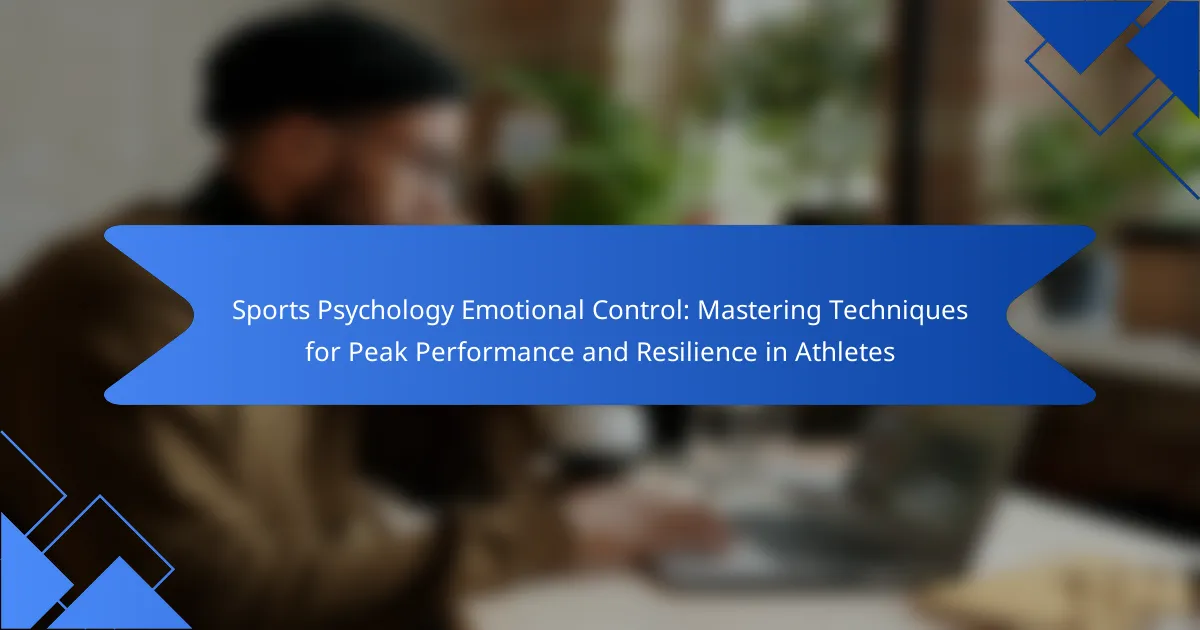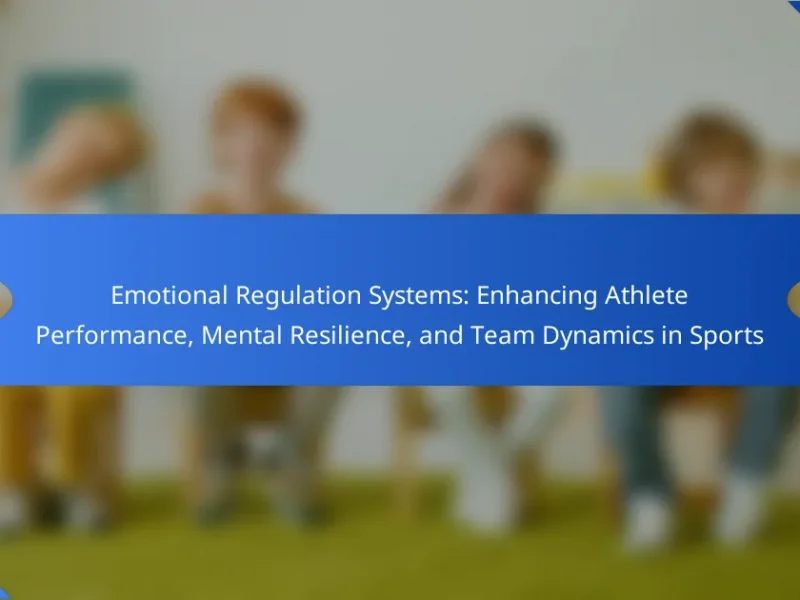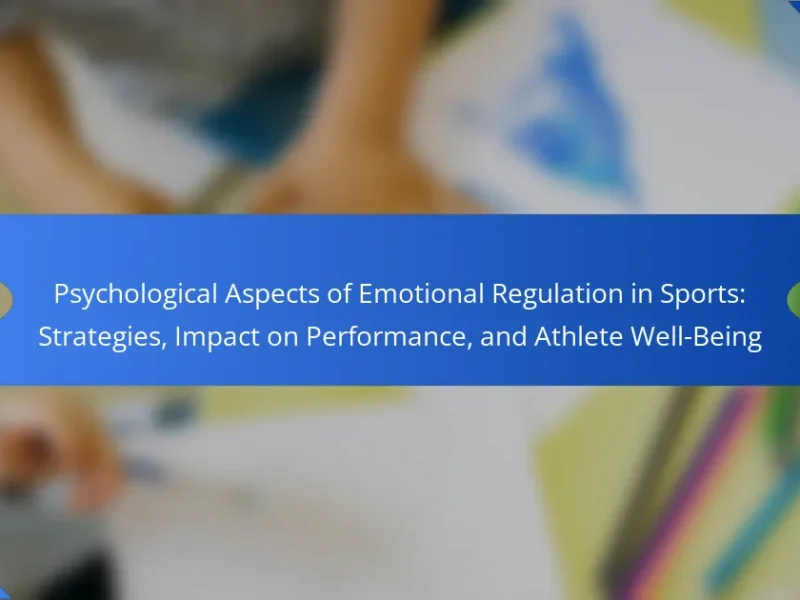Emotional control is crucial for athletes seeking peak performance and resilience. This article explores self-awareness, cognitive restructuring, emotional expression, and coping strategies. It addresses common challenges like anxiety, pressure management, and focus maintenance. Mastering these techniques can significantly enhance athletic performance in competitive environments.
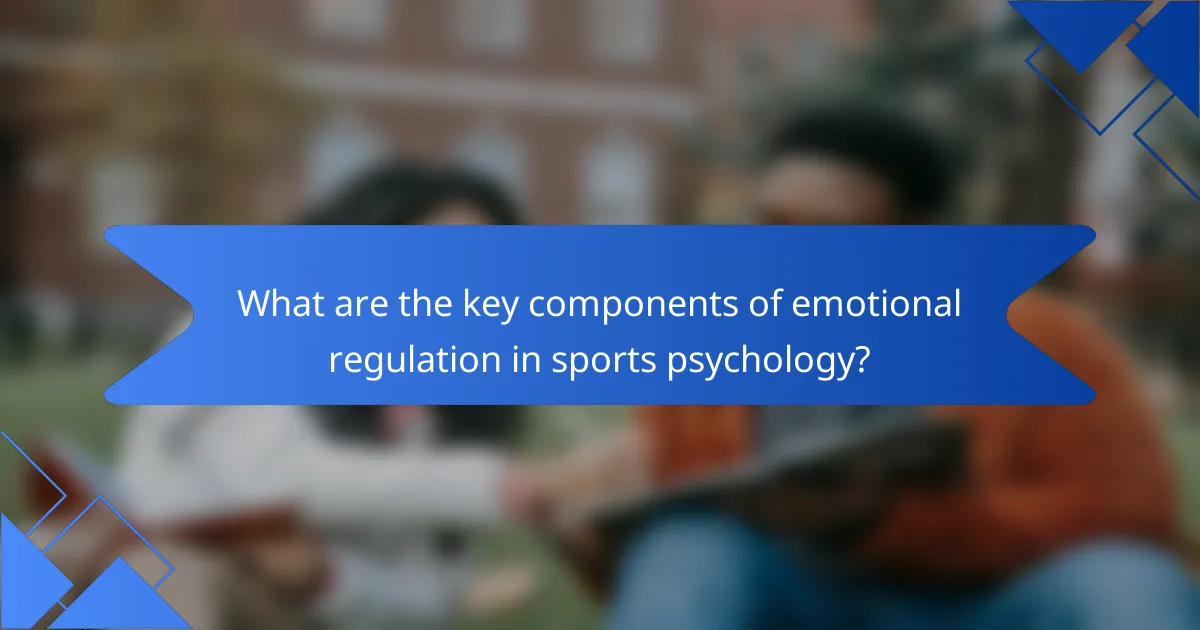
What are the key components of emotional regulation in sports psychology?
Emotional regulation in sports psychology involves awareness, control, and the ability to manage emotions effectively. Key components include self-awareness, cognitive restructuring, emotional expression, and coping strategies.
Self-awareness allows athletes to recognize their emotional states, enhancing focus and performance. Cognitive restructuring helps in reframing negative thoughts, promoting a positive mindset. Emotional expression ensures athletes can communicate feelings, fostering team dynamics. Coping strategies, such as mindfulness and relaxation techniques, support resilience during high-pressure situations.
These components collectively contribute to peak performance by enabling athletes to maintain composure and adaptability in competitive environments.
How do emotional regulation systems impact athlete performance?
Emotional regulation systems significantly enhance athlete performance by improving focus and resilience. Effective emotional control allows athletes to manage stress, maintain motivation, and recover from setbacks. Research indicates that athletes with strong emotional regulation skills exhibit better concentration and decision-making under pressure. These skills can be developed through techniques such as mindfulness, cognitive restructuring, and self-talk strategies, leading to improved overall performance and mental toughness.
What techniques enhance emotional control for athletes?
Athletes can enhance emotional control through techniques such as mindfulness, visualization, and self-talk. Mindfulness improves focus and reduces anxiety by promoting present-moment awareness. Visualization helps athletes mentally rehearse performance, fostering confidence and reducing stress. Self-talk encourages positive reinforcement, enabling athletes to manage their emotions effectively.
How does cognitive restructuring improve emotional responses?
Cognitive restructuring enhances emotional responses by shifting negative thought patterns. This technique allows athletes to reframe their perceptions, reducing anxiety and improving focus. As a result, athletes experience increased resilience and peak performance. Research shows that cognitive restructuring can lead to a 30% improvement in emotional regulation among athletes, enhancing their overall mental game.
What role does mindfulness play in emotional regulation?
Mindfulness significantly enhances emotional regulation by promoting awareness and acceptance of feelings. This practice allows athletes to manage stress and anxiety, leading to improved focus and performance. Research shows that mindfulness can reduce emotional reactivity, enabling athletes to maintain composure under pressure. By incorporating mindfulness techniques, athletes develop resilience, which is crucial for peak performance in competitive environments.
How can visualization techniques aid in emotional control?
Visualization techniques enhance emotional control by enabling athletes to mentally rehearse scenarios, reducing anxiety and improving focus. These techniques promote resilience by fostering a positive mindset and increasing self-efficacy. For example, imagery allows athletes to visualize successful performances, which can lead to improved emotional regulation during competition. As a result, athletes can better manage stress and maintain composure under pressure, ultimately enhancing their overall performance.
What are the universal benefits of emotional regulation for athletes?
Emotional regulation enhances athletes’ performance by improving focus, resilience, and stress management. It fosters better decision-making and emotional stability during competitions. Mastering emotional control leads to increased confidence and reduces anxiety, allowing athletes to perform at their peak. Additionally, emotional regulation contributes to long-term mental health, promoting overall well-being.
How do unique emotional regulation strategies vary across different sports?
Unique emotional regulation strategies vary significantly across different sports, reflecting the specific demands and environments of each discipline. For instance, team sports like football often emphasize collective emotional control, fostering communication and cohesion among players. In contrast, individual sports such as tennis require athletes to develop personal strategies for managing stress and anxiety during matches.
Research indicates that athletes in high-pressure sports, such as gymnastics, utilize visualization techniques to enhance emotional resilience, while endurance athletes may rely on self-talk to maintain focus and motivation over long distances. These strategies not only improve performance but also contribute to overall mental well-being.
Furthermore, unique attributes of emotional regulation in combat sports often include aggression modulation, allowing athletes to harness their emotions for competitive advantage while avoiding detrimental outbursts. Understanding these variations helps coaches tailor psychological training to enhance athletes’ emotional control, ultimately leading to peak performance.
What rare emotional regulation practices are emerging in professional sports?
Emerging rare emotional regulation practices in professional sports include mindfulness-based stress reduction, biofeedback techniques, and expressive writing. These practices enhance athletes’ emotional resilience and focus. Mindfulness helps athletes stay present, reducing anxiety during competitions. Biofeedback allows athletes to monitor physiological responses and regulate emotions effectively. Expressive writing offers a safe space for athletes to process experiences, leading to improved mental clarity and performance.
How can athletes develop resilience through emotional regulation?
Athletes can develop resilience through emotional regulation by employing specific techniques. Techniques such as mindfulness, cognitive restructuring, and controlled breathing help athletes manage stress and maintain focus. Mindfulness enhances awareness of thoughts and emotions, enabling athletes to respond rather than react. Cognitive restructuring allows for reframing negative thoughts into positive ones, fostering a growth mindset. Controlled breathing techniques reduce anxiety, promoting calmness during high-pressure situations. These strategies collectively strengthen emotional control, which is essential for resilience in competitive sports.
What are the best practices for maintaining emotional balance during competitions?
To maintain emotional balance during competitions, athletes should implement techniques such as mindfulness, visualization, and controlled breathing. Mindfulness helps in staying present, reducing anxiety. Visualization allows athletes to mentally rehearse scenarios, boosting confidence. Controlled breathing techniques regulate physiological responses, promoting calmness. Regular practice of these techniques enhances resilience, leading to improved performance under pressure.
What common mistakes do athletes make in emotional regulation?
Athletes often struggle with emotional regulation due to common mistakes. These include neglecting mental training, allowing negative self-talk, failing to set realistic goals, and not utilizing coping strategies effectively. Such errors can hinder performance and resilience. For example, athletes may overlook visualization techniques that enhance focus and confidence. As a result, emotional instability can lead to poor decision-making during competitions. Addressing these mistakes is crucial for achieving peak performance.
What expert insights can guide athletes in mastering emotional control?
Athletes can enhance emotional control through techniques like mindfulness, visualization, and cognitive restructuring. These strategies foster resilience and peak performance by helping athletes manage stress and maintain focus under pressure. Mindfulness practices, such as meditation, improve self-awareness and emotional regulation. Visualization techniques enable athletes to mentally rehearse successful performances, reducing anxiety. Cognitive restructuring helps athletes reframe negative thoughts, promoting a positive mindset. Implementing these expert insights can lead to improved emotional stability and overall athletic performance.
How can coaches support athletes in developing emotional regulation skills?
Coaches can support athletes in developing emotional regulation skills by implementing structured training techniques. These techniques include mindfulness practices, cognitive behavioral strategies, and emotional awareness exercises.
Mindfulness training helps athletes focus on the present moment, reducing anxiety and enhancing performance. Cognitive behavioral strategies teach athletes to identify and reframe negative thoughts, promoting a positive mindset. Emotional awareness exercises encourage athletes to recognize and understand their emotions, enabling them to manage their reactions effectively.
As a result, athletes develop resilience and improve their overall performance. Coaches should integrate these methods into regular training sessions to foster a supportive environment for emotional growth.
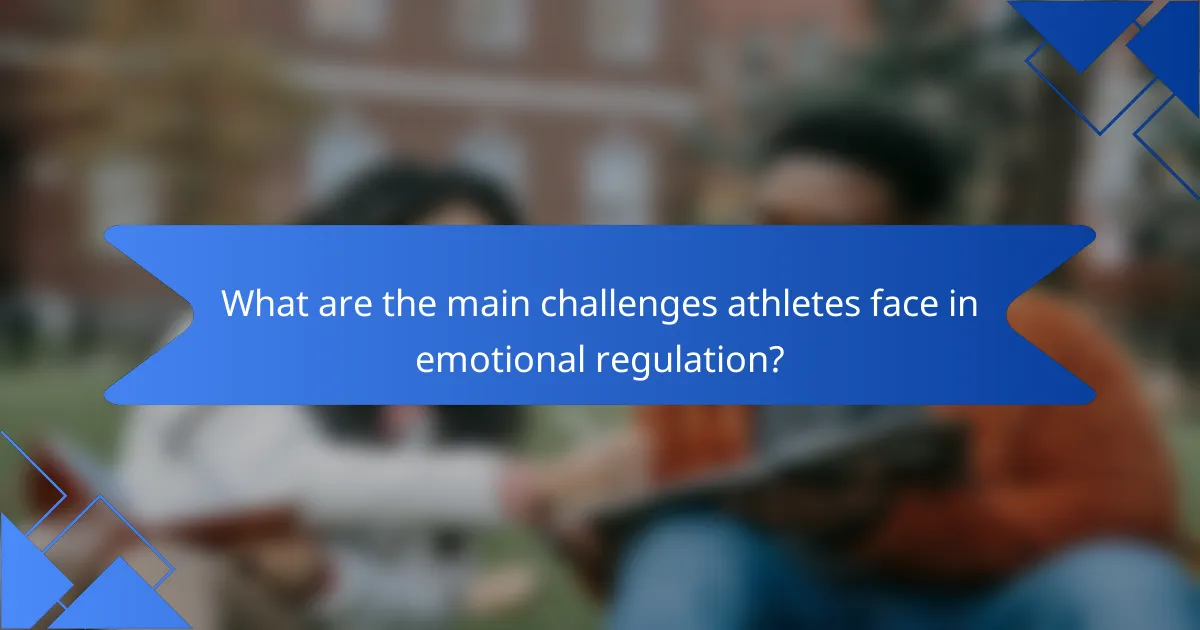
What are the main challenges athletes face in emotional regulation?
Athletes face challenges in emotional regulation, including anxiety, pressure management, and maintaining focus. These emotional hurdles can hinder performance and resilience. Anxiety often stems from competition stress, leading to decreased confidence. Pressure management is crucial, as excessive expectations can overwhelm athletes. Additionally, maintaining focus amidst distractions is essential for peak performance. Effective emotional control techniques can help athletes navigate these challenges, fostering resilience and enhancing overall performance.
How do external pressures affect emotional control in sports?
External pressures can significantly hinder emotional control in sports, impacting performance and resilience. Factors such as audience expectations, media scrutiny, and competition stress can lead to anxiety and decreased focus. Athletes often struggle to maintain composure under these pressures, which can result in mistakes and diminished performance. Techniques such as mindfulness and visualization can help athletes manage these external influences, enhancing their emotional control and overall performance.
What role does team dynamics play in emotional regulation?
Team dynamics significantly influence emotional regulation in athletes. Positive interactions foster resilience and enhance emotional control. Cohesion within a team promotes shared coping strategies, reducing stress and improving performance under pressure. Effective communication and mutual support enable athletes to manage emotions, leading to peak performance. A study found that teams with strong dynamics report lower anxiety levels and higher overall satisfaction, underscoring the value of teamwork in sports psychology.
How can athletes overcome setbacks using emotional regulation techniques?
Athletes can overcome setbacks by employing emotional regulation techniques such as mindfulness, cognitive restructuring, and self-compassion. These methods enhance resilience and improve performance under pressure. Mindfulness allows athletes to stay present, reducing anxiety and negative thoughts. Cognitive restructuring helps in reframing setbacks as learning opportunities, fostering a growth mindset. Self-compassion promotes emotional healing, enabling athletes to treat themselves kindly during tough times. Implementing these techniques leads to improved emotional control and peak performance.
What are the long-term effects of emotional regulation on athlete well-being?
Long-term emotional regulation positively impacts athlete well-being by enhancing mental resilience and reducing stress. Athletes who master emotional control experience improved focus, better performance, and lower rates of burnout. Studies show that consistent emotional regulation practices contribute to greater life satisfaction and emotional stability. As a result, athletes are more equipped to handle the pressures of competition and maintain a balanced life.
How can athletes measure their emotional regulation progress?
Athletes can measure their emotional regulation progress through self-assessment tools and performance metrics. Regularly tracking mood states, stress levels, and coping strategies provides valuable insights. Utilizing techniques like journaling or mobile apps enhances self-awareness. Additionally, feedback from coaches or sports psychologists can highlight areas for improvement.
What resources are available for athletes seeking to improve emotional control?
Athletes can access various resources to enhance emotional control, including workshops, books, and online courses. Sports psychologists offer personalized coaching tailored to individual needs. Mindfulness and meditation apps provide practical techniques for emotional regulation. Peer support groups foster shared experiences and coping strategies. Additionally, performance analytics tools help athletes identify emotional triggers and patterns.
